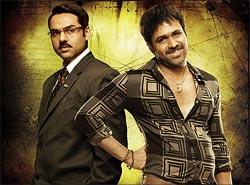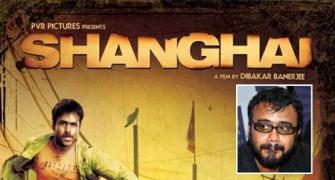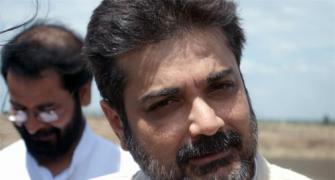 Raja Sens says Shanghai is a Dibakar Banerjee show all the way.
Raja Sens says Shanghai is a Dibakar Banerjee show all the way.
At first glance, the irony is staggering.
A country pretending to be another, brighter country, being shown up by a film that itself borrows form and content from another country. Yet so strident is Dibakar Banerjee's voice as a filmmaker that even this adaptation -- of Vassilis Vassilikos' Z, about a wholly different time and political situation -- is turned into a strikingly relevant story of our times and our crimes.
From collision to collusion, it's remarkable -- and alarming -- how a novel about a specific real-life assassination in Greece can be transposed onto a local, current setting, as Banerjee and co-writer Urmi Juvekar very effectively make the story ours.
The fact that this can at all be done, of course, goes beyond irony and into absurdity, and this futility of man versus machine fuels both Banerjee's Shanghai and the original Z. The wrong remains the same.
The time is now, the location pointedly fictional and decidedly familiar. Banerjee's burgeoning Bharatnagar is the crown jewel of its rotund Chief Minister's forward-thinking (and builder-friendly) new state. Her political party is unsubtly called IBP, which stands for India Bane Pardes, a frighteningly believable extension of the India Shining wool pulled over offscreen voter eyes.
Investments are on the up, ambitious structures with futuristic names are poised to hoist a skyline that never was, and all is well with the overfed world. Or all would be, if not for social activists determined to ask sticky questions and rally the exploited masses. And thus is a stone hurled at activism's head.
Dr Ahemadi, struck by said rock, reaches his makeshift stage undeterred and brushes it off dryly, calling it hail. Cue applause.
The man is a convincing speaker, a natural leader of emphatic grace and significant charisma, and a serious itch IBP can't wait to scratch. Or scratch out.
Ahemadi finishes speaking and is mowed down in what the police explain away as a drunk-driving case. The activists are enraged and Ahemadi's wife, declaring the incident a premeditated attack, cries out for justice on national TV, forcing the Government to set up a routine enquiry. The film then unfolds out into a constantly tense procedural with unlikely protagonists, a dark and shadowy ride that lives up to its immense promise.
Banerjee's genius has always been most visible in his meticulous detailing, and this latest film is expectedly crammed with beautiful nuance. A minister strikes poses alone ahead of a green screen, his droves of supporters to be chromakeyed in later. An opportunistic hoodlum takes English language classes, eager to score a job where he can wear a necktie. An IAS officer, in turn, warily slips his tie on only for meetings, and conducts his evening prayers with the help of a laptop.
High-ranking policemen play badminton, and swarthy politicians jog on treadmills with assistants standing by holding water and snacks. And helpless indecision is expressed fantastically by a man twirling a paneer tikka, too worried to actually eat it.
The little touches are smashing, fleshing out most of the characters and making them into more than words and actors.
Yet what words, what actors. Emraan Hashmi, as the scruffy videographer out for a quick buck, delivers a knockout punch as he masters a complicated role. From his infuriatingly goofy laugh to poor attempts at making conversation, Hashmi proves himself the best of a very fine ensemble. He occasionally shoots porn -- this is off-camera, we see him ask his subjects to clear up and hear the hurried sounds of straps and zippers -- and later, when the film's heroine is about to sit on his bed, he instinctively barks that she sit somewhere else, because the bed's dirty. It's a throwaway grunt but Hashmi nails it -- just like he nails highly energetic pelvic thrusts in a streetdance, one where he keeps biting his tongue, faux-scandalised by the words of the song.
It's one of the best performances from one of our leading men in quite some time, and in one chilling pre-climactic moment, when sitting on the floor and confounded by the situation, his plaintive wail is fittingly reminiscent of the late great Ravi Baswani's angst in Jaane Bhi Do Yaaro's darkest minute.
Bravo.
Pitobash Tripathy is a treat, uninhibited enough to propel the narrative forward himself. As the ambitious thug wondering what they call 'mutton' in English, he's a firecracker with a very distinctive screen presence.
While on presence, Bengali veteran Prosenjit Chatterjee is perfectly cast as the unflinching rabble-rouser, commanding even with his matinee-idol persona muted.
Farooque Shaikh is reliably excellent, while Abhay Deol manages to make his silences count. Playing an IAS officer applauding an item song with an eye on a Stockholm assignment, Deol wears his inscrutability thickly and delivers a strong performance.
Kalki Koechlin is given a newly-minted character that is flawed from the start, a too-defiant activist who spends most of the film wound unbearably, annoyingly tight, but this is made up for by a moment near the end of the film where she explodes into a magnificent mess. It's the film's most searingly honest moment.
Banerjee's film borrows from Costa Gavras' 1969 adaptation of Z frequently, with a photographer carrying his camera consistently near his torso, scrutinisingly tight close-ups and a nearly-identical scene with a bathroom mirror, but, most critically, he follows the narrative pace almost exactly, and keeps up perfectly, even if the new version is more dramatic. It is the departures from the blueprint that don't always work, like the creation of Kalki's character and turning her into a lone crusader, or the climactic piece of evidence that's impossible to swallow and wraps up the proceedings all too conveniently. And yet Banerjee must be lauded for not dumbing things down and creating a mature, serious film that engages, thrills and amuses.
Z was named after an iconic one-letter cry of Greek protest, but Shanghai is all Dibakar, who we must lift on our shoulders with grateful pride. And we must exult in the fact that this D is never silent.
Rediff Rating: 









